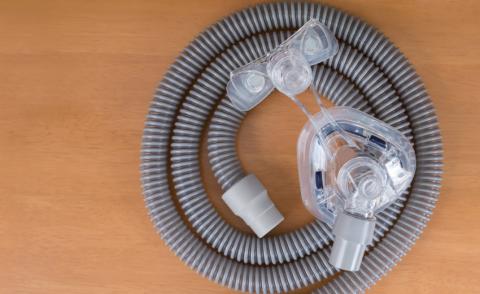“Oh! You’re not getting enough air!”
I had barely entered the room when the woman looked up at me and made this odd proclamation. I was flustered. Not enough air? What was she talking about?
I’m a hospital chaplain, and a nurse had asked me to visit this discouraged patient who had chronic pulmonary obstructive disease, commonly known as COPD. You’ve probably seen ads on television for drugs that treat it, often showing an older man, struggling to catch his breath so he can play with his grandchild.
The patient noticed the bemused look on my face and apologized. “Sorry,” she said warmly. “I’m Rose.”
Rose looked to be in her sixties. She was propped up in her hospital bed on a mound of pillows, too fluffy to be hospital-issue. She was not wearing an unflattering hospital gown but a frilly white nightgown she also must have brought from home. I surmised her hospital stays were frequent.
I introduced myself as the chaplain and asked her what she meant by the “air” comment.
“I didn’t mean to startle you,” she said. “It’s just that it’s so obvious to me. You’re not getting enough oxygen.”
I didn’t know what to say. Now, she was flustered. “I’m not crazy,” she said. “Really. I know that seemed pretty crazy. But I’ve been struggling with COPD for so long now. I can SEE, I can FEEL, oxygen deficiency.”
“And you see it in me?” I asked.
“Yes. Strongly.”
I pressed her to explain. “I just know it,” she said, and she shrugged.
I sat next to her bed, and we moved on to other topics. She was not, I realized after a few minutes, crazy. She was dealing with a chronic long-term ailment that was gradually robbing her of breath, of life. She struggled with accepting it. It was a lovely visit. She never claimed any other super powers.
When I left the room, I immediately got a call to another patient, so I did not have time to ponder that perceived air deficiency. I thought about it that night as I dozed off. What did she see? Were my lips blue? My skin pale? It was so random, so strange. I dismissed it.
Months later, I could not shake her ominous exclamation. Should I see a doctor? I’d seen my primary care physician and other specialists over the previous years, but no one had ever suggested something was amiss. However, my husband had been telling me for years that I snored. I knew that snoring could be a sign of sleep apnea. I was often fatigued, but who isn’t? Still, I decided to make an appointment with a sleep specialist.
He had me do a sleep study, an overnight stay in a sleep lab with wires and cords attached to my head, torso, and ankles. In spite of the tangle of wires, I eventually fell asleep. When I awoke the next morning, I thought I had slept well. No problem. This whole thing was silly.
When the results came back later, I sat across from the doctor as he said, “Well. You have sleep apnea. Bad enough that you really need to be treated. This can adversely affect your heart and brain.”
I was stunned. He showed me the graphs detailing my nocturnal breathing patterns resulting in problematic low oxygen levels. The line across the page showed regular sharp drops indicating I had stopped breathing. Some of these downward spikes dipped below an eighty percent oxygen level. Eighty percent! A normal person walks around with oxygen levels between ninety-five and one hundred percent. I listened as he explained the efficacy of CPAP therapy.
When he was finished, he said. “I’m just curious. Why did you happen to come in to see me?”
OK. He asked for it. I told him. The whole thing—the visit with Rose, her COPD and the “You’re not getting enough air” comment.
He laughed. “Oh, my wife would love that story,” he said. “She likes that kind of…’’ he searched for a word, “stuff that can’t be explained.” He closed his laptop and smiled at me benignly.
Huh. Well, as a man of science who deals with numbers and charts every day, he wouldn’t want to write this up in The New England Journal of Medicine. I smiled back.
I have since read about people who claim to be medical intuitives. Whether Rose knew this term or not, it is what she was doing with me—intuiting a medical problem. Her own long struggle with breath had probably fine-tuned her ability to intuit oxygen deficiency
I now sleep with a CPAP machine every night. I feel like Darth Vader with the face mask and the husky breath sounds. However, I sleep better and feel less fatigued. I no longer stop breathing thirty times an hour.
I thought that I owed Rose a “thank you.” Maybe it’s a bit dramatic to say she saved my life, but she certainly spotted a huge problem with my health and well-being before it became life-threatening. However, too much time had elapsed for me to find Rose. I could not remember her last name, or on which day I saw her or what room. Besides, it smacked of a HIPAA violation.
I still can see her wearing that frilly nightgown, propped up on the pillows. I wonder if she remembers me and if she can still decipher oxygen levels without an oximeter.


